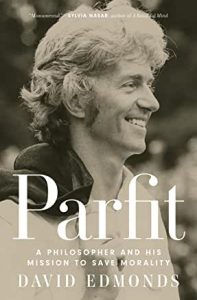I’ve thoroughly enjoyed reading Parfit: A philosopher and his mission to save morality by David Edmonds. I’ve always felt faintly guilty at never even having tried to read anything by Derek Parfit, given the reverent tone in which he’s mentioned by many philosophy folks. Much as I liked this book by Edmonds, a wonderfully clear and lovely writer (see eg Wittgenstein’s Poker), it helped confirm my decision not to try Parfit’s own tomes.
The main reason for my persistence with happy ignorance is that Parfit’s method was evidently the thought experiment, which is an approach that seems utterly unpersuasive to me – so what if something might be the case in a wildly unrealistic scenario, like someone whose arms reach the length of the Indian subcontinent? (As for the trolley problem, please give me strength.)
I’ll make do with what I’ve taken from this biography – Parfit’s claim that moral statements (eg it is wrong to torture innocent children) can be objective (the denial of this implying that morality is only ever relative); his belief that the main ‘schools’ of moral philosophy can be reconciled; and his view of personal identity as continuous psychological experience. I do try, but philosophy is difficult. There’s one anecdote here about an example Parfit gives that has Peter Singer dramatically changing his mind – and I just don’t understand the example (someone indifferent to pain on future Tuesdays….), which seems absurd.
Not that this spoiled my enjoyment of the book. For its hero is an extraordinary character. He went from private prep school to Eton to Balliol to All Souls – a literally cloistered life – albeit doing a lot of teaching in US universities, and obsessively visiting Venice and St Petersburg to photograph them. Obsessive is a theme – for example one ends up deeply pitying the poor OUP publishing team that had to deal with Parfit’s manuscripts. And not only did Parfit lead such an inherently sheltered life, he became ever more reclusive, spending all his time working, fueled by pills and vodka. Somehow he managed a long relationship and eventually marriage to Janet Radcliffe Richards (who must be saintly, and whose 1980 book The Sceptical Feminist had a big influence on me).
There seems no doubt Parfit was a genius. He influenced many other philosophers profoundly, and the book traces his impact, for instance, on the Effective Altruism movement and the study of existential risk, as well as contributions to thinking about the future – climate change and population growth. Tyler Cowen describes Parfit as ‘the most important philosopher of his era’. Edmonds discusses whether or not Parfit was autistic, tilting towards ‘yes’ without reaching a firm conclusion.
A fascinating and important person. I do highly recommend the biography – and good wishes to those who bravely decide to tackle Parfit’s own Reasons and Persons and On What Matters (all 3 volumes).

